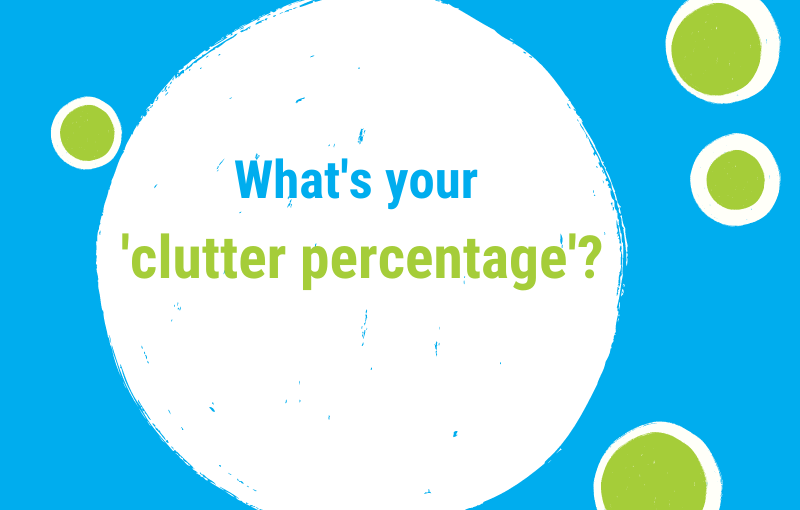What percentage of your home is occupied by clutter? What does it cost you?
Side-effects of the clutter in our homes
In a recent post, I discussed “The negative side-effects of clutter (read more)”.
At that time, I focused mainly on all the different reasons why clutter in our home can create clutter in our mind and life:
Living in a cluttered environment can be very harmful to our general well-being, mental health and social relationships.
Today, I wish to look at the negative effects clutter can have on our finances.
This is not about the money we spent for buying things which (immediately or) later became clutter. The money is gone and we can’t do anything about it. (Even if we find a buyer for clutter-items, we usually get back only a fraction of the amount we originally paid for the items.)
However, there are other clutter-related costs that are actually avoidable.
Our clutter causes financial costs on an ongoing basis.
Have you ever thought about how much of the monthly mortgage or rent is devoted to storing your clutter?
Usually, we are completely unaware of these ‘silent’ expenses.
I have to admit that I never ever thought about our monthly clutter-storing costs.
The following little exercise was an eye-opener for me.
You might wish to do this exercise, too. Be prepared to get surprised.
EXERCISE: What percentage of your home is occupied by clutter?
Step 1
Walk through your home and make a list of all rooms. Include closets that are separate from rooms or have special functions (such as the linen closet, the pantry, or the broom closet). Don’t forget outside areas, such as the garden shed. The garage, the attic and the basement, of course, need to be added to the list as well.
Step 2
Go into each room and estimate the percentage of space that is taken up by clutter. Include space on book shelves, space under the beds, the built-in shelves and cupboards/wardrobes. Don’t make rash estimations, take some time. Try to take a ‘stranger’s point-of-view’ – this can help to make your estimations more neutral and objective.
Write the estimated percentage behind each room and storage area on your list.
Step 3
Add up the percentages per room/area, then divide the sum by the number of rooms/areas (see example below). The result is the average amount of clutter per area in your home. It’s also the percentage of the monthly mortgage or the rent that is eaten up by the clutter in your home!
My personal example:
I did the exercise and expected a very low clutter-percentage, something like 1 or 2 %. After all, I am a professional professional, thus my home should be a rather clutterfree!
This is my list of our rooms and the results of my clutter-percentage estimation:
-
- Home office – 10 %
I have some business-related books that I no longer need, they should go. We need to declutter our folders and organise our paperwork better. My husband has lots of magazines and piles of papers that have been on his to-do list for a while.
-
- Bedroom – 3 %
Our bedroom is very clear and clean. We could/should sort through the stuff on/in our bed side tables.
-
- Entrance area and hallway – 15 %
We have some boxes we should clear up (winter accessories like scarfs), also the shoe cupboard. We decluttered the book shelves recently but we still have too many travel guides we haven’t used for ages.
-
- Guestroom – 3 %
It looks clear and empty but I am not sure what’s in the box under the bed.
-
- Living room – 1 %
First, I wanted to assign 20 % to this room. The living room is the only room in the house where my husband and I have clutter-disagreements. For him his stereo system, the speakers and all the CDs are very valuable things – although he hasn’t used them for a very long time. (Today a portable system and Spotify do the job.) The piano is another issue. He hasn’t played it for some years but he loves and ‘needs’ it. I see it differently but our current agreement is that it’s not clutter. Thus, the 1% is correct, at the moment.
-
- Bathroom – 8 %
This is my weak point – I buy toiletries too often and store too much stuff. We also have too many travel toiletry bags, filled with too much never used stuff.
-
- Kitchen, pantry and laundry – 10 %
We completely decluttered the kitchen and the areas next to it two years ago. I assume it’s time to do another round. However, I hope there’s not more than 10 % clutter.
-
- Terrace and backyard – 3 %
There are some smaller garden tools we no longer use but otherwise it’s clear.
-
- The garage – 2 %
There is some stuff that we don’t use often but we need it from time to time, it’s not clutter (golf bag, party chairs). We have some items in the garage that will go with the next council rubbish pick-up.
My calculation: 10+3+15+3+1+8+10+3+2=55/9=6.1
The result: Our clutter-percentage is 6.1. This means that 6.1 % of our monthly rent is devoted to storing our clutter. I am not happy about this result!
My resolution: I am determined to start a decluttering project. I’ll clear up the kitchen, the home office and the hallway/entrance area. I’m going to start the project on next weekend and will finish it before the end of next month.
What about you?
Do you feel motivated to do the exercise now? Give it a try!
And if you are not happy with the result – Don’t beat yourself up!
Awareness is a good thing. And it can be the first step of your next decluttering project.
Choose the room with the highest clutter-percentage. Then start to declutter that room, step-by-step. Finish with a new estimation of the percentage.
And celebrate your success!
HOW CAN I HELP YOU?
Are you tired?
Tired of trying to (re)organise the various areas of your life entirely on your own?
Fortunately, you don’t have to figure it out all by yourself.
We can do it together.
You can decide to get my support, advice, and guidance – and achieve the desired changes in your life so much faster and easier.


I have a walk way through my home
I would like your help
But not now
I just finished my first aid box.
Really, I’m too emotional right now.
I will get back to you?
All good, Jacqueline. Take your time. You will know when it’s the right time for you to get started with decluttering.
Take care of yourself first before you take care of your belongings.
Yes – TAKE CARE!
Margo